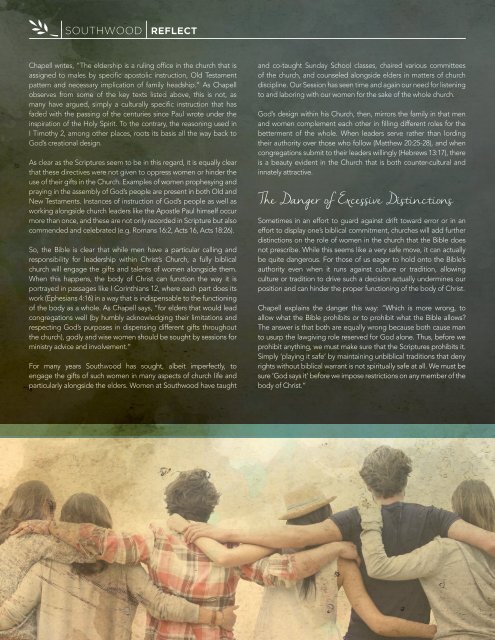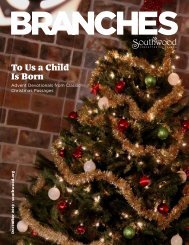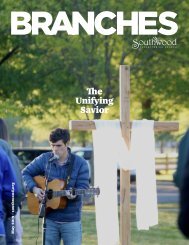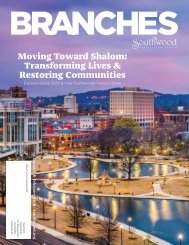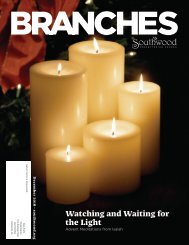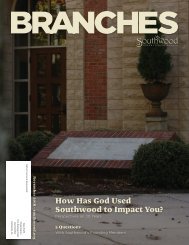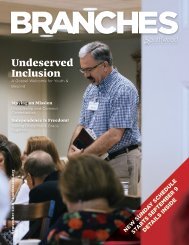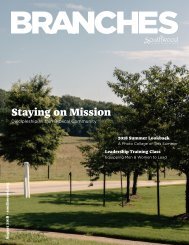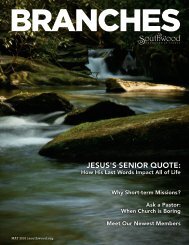BRANCHES November 2014
Create successful ePaper yourself
Turn your PDF publications into a flip-book with our unique Google optimized e-Paper software.
SOUTHWOOD<br />
reflect<br />
Chapell writes, “The eldership is a ruling office in the church that is<br />
assigned to males by specific apostolic instruction, Old Testament<br />
pattern and necessary implication of family headship.” As Chapell<br />
observes from some of the key texts listed above, this is not, as<br />
many have argued, simply a culturally specific instruction that has<br />
faded with the passing of the centuries since Paul wrote under the<br />
inspiration of the Holy Spirit. To the contrary, the reasoning used in<br />
I Timothy 2, among other places, roots its basis all the way back to<br />
God’s creational design.<br />
As clear as the Scriptures seem to be in this regard, it is equally clear<br />
that these directives were not given to oppress women or hinder the<br />
use of their gifts in the Church. Examples of women prophesying and<br />
praying in the assembly of God’s people are present in both Old and<br />
New Testaments. Instances of instruction of God’s people as well as<br />
working alongside church leaders like the Apostle Paul himself occur<br />
more than once, and these are not only recorded in Scripture but also<br />
commended and celebrated (e.g. Romans 16:2, Acts 16, Acts 18:26).<br />
So, the Bible is clear that while men have a particular calling and<br />
responsibility for leadership within Christ’s Church, a fully biblical<br />
church will engage the gifts and talents of women alongside them.<br />
When this happens, the body of Christ can function the way it is<br />
portrayed in passages like I Corinthians 12, where each part does its<br />
work (Ephesians 4:16) in a way that is indispensable to the functioning<br />
of the body as a whole. As Chapell says, “for elders that would lead<br />
congregations well (by humbly acknowledging their limitations and<br />
respecting God’s purposes in dispensing different gifts throughout<br />
the church), godly and wise women should be sought by sessions for<br />
ministry advice and involvement.”<br />
For many years Southwood has sought, albeit imperfectly, to<br />
engage the gifts of such women in many aspects of church life and<br />
particularly alongside the elders. Women at Southwood have taught<br />
and co-taught Sunday School classes, chaired various committees<br />
of the church, and counseled alongside elders in matters of church<br />
discipline. Our Session has seen time and again our need for listening<br />
to and laboring with our women for the sake of the whole church.<br />
God’s design within his Church, then, mirrors the family in that men<br />
and women complement each other in filling different roles for the<br />
betterment of the whole. When leaders serve rather than lording<br />
their authority over those who follow (Matthew 20:25-28), and when<br />
congregations submit to their leaders willingly (Hebrews 13:17), there<br />
is a beauty evident in the Church that is both counter-cultural and<br />
innately attractive.<br />
The Danger of Excessive Distinctions<br />
Sometimes in an effort to guard against drift toward error or in an<br />
effort to display one’s biblical commitment, churches will add further<br />
distinctions on the role of women in the church that the Bible does<br />
not prescribe. While this seems like a very safe move, it can actually<br />
be quite dangerous. For those of us eager to hold onto the Bible’s<br />
authority even when it runs against culture or tradition, allowing<br />
culture or tradition to drive such a decision actually undermines our<br />
position and can hinder the proper functioning of the body of Christ.<br />
Chapell explains the danger this way: “Which is more wrong, to<br />
allow what the Bible prohibits or to prohibit what the Bible allows?<br />
The answer is that both are equally wrong because both cause man<br />
to usurp the lawgiving role reserved for God alone. Thus, before we<br />
prohibit anything, we must make sure that the Scriptures prohibits it.<br />
Simply ‘playing it safe’ by maintaining unbiblical traditions that deny<br />
rights without biblical warrant is not spiritually safe at all. We must be<br />
sure ‘God says it’ before we impose restrictions on any member of the<br />
body of Christ.”


